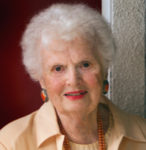By Natasha Josefowitz, ACSW, Ph.D.

LA JOLLA, California — You swing gently on your trapeze somewhere near the top of the circus tent. It’s comfortable and secure, and then you see the next trapeze hurtling towards you. As you gage the time and the distance, you have to decide when the appropriate moment will come for you to leave the safe bar you’re hanging from and leap into the void, arms outstretched to grasp the empty bar as it swings towards you.
While you’re hurtling through the void, that moment between the two trapezes, that moment when you could either fall and hurt yourself or grasp the bar and haul yourself onto it for another safe and secure time—in that moment you’re in transition. If you stay too long on your comfortable trapeze, you will become sedentary, fat, bored, and eventually depressed. At some point you will have to make the leap. We all have hurled ourselves into outer space, into unknown territories: every time we have changed jobs, gotten married or divorced, experienced the death of a loved one, given birth to a child, started a relationship, moved to a new location, or changed a lifestyle.
As we grow older, we tend to hang on to the more familiar. It becomes more of an effort to let go of one’s trapeze in order to catch the next one. We are less confident of flying through the air, of living in that time of transition, of leaving the known to explore the unknown. We are indeed less nimble, less pliant, more attached to the old ways. Yet, our salvation is to keep jumping, arms outstretched into the new—yes, that leap is our salvation against aging brains, stiff bodies, dull routines, unsatisfying relationships, and diminished lives. It’s imperative for us all, as we go through life’s stages, to not be afraid of transition—that nowhere place we find ourselves in as we leave the familiar and are not yet acquainted with the unfamiliar.
The pandemic is now giving us this opportunity to leave the safety of our homes and indoor lives that had shrunk to encompass less and less of the outside world. Indeed we will encounter a different world from the one we left fifteen months ago. We will also have to familiarize ourselves with the different person we have become, having experienced isolation with fewer, if any, stimulating encounters. According to newspaper accounts, more people will now work from home, more children will learn online (either full or part-time), more time will be spent cooking and interacting with one’s spouse and children, or simply being comfortable alone. So the leap from one trapeze to the next is really encountering the unfamiliar, the potentially uncomfortable, but also the possible discovery of a more discriminating self who may prefer to be less active, less available, more home-bound. Friends may also have changed in unpredictable ways, which will need a reacquaintance with their new values and behaviors. We may have learned that sitting quietly just thinking is not wasting time; that it may be as productive as non-stop activity.
Our aging processes have also speeded up during these months. We may have plateaued for a while prior to the pandemic, remaining the same age for some years, but now suddenly we have grown into our actual and current age. We will need to reassess a possibly less resilient body, a slower step, diminished energy; new eye glasses and hearing aids may now be a necessity as well as new attention paid to nutrition and exercise in order to ward off disability. Successful aging is determined by lifestyle choices more than by heredity.
We will need to discard old, no longer useful habits and learn new ways of being, of seeing, of feeling, of acting. Our habits will need to change as we meet up with this new world with our different bodies, as we examine opportunities with a new outlook. Do we explore and acceed? Or do we retreat and linger longer in uncertainty? This is the period of transition which is by definition uncomfortable. Who are we, less certain of what these new steps will look like, more tentative, and yet leap we must? It may take a while to find comfort. Even if we fall at first, there is always a safety net we can bounce back up on… and so we will fly through the air with the greatest of ease, the daring old people on the flying trapeze.
*
© Natasha Josefowitz. This article appeared initially in the La Jolla Village News. You may comment to natasha.josefowitz@sdjewishworld.com